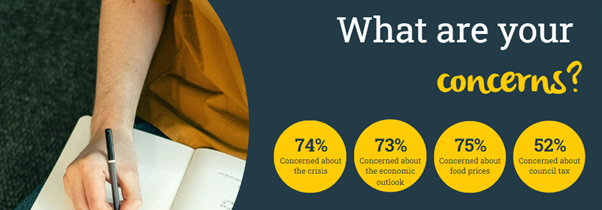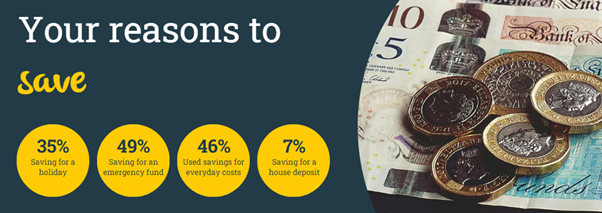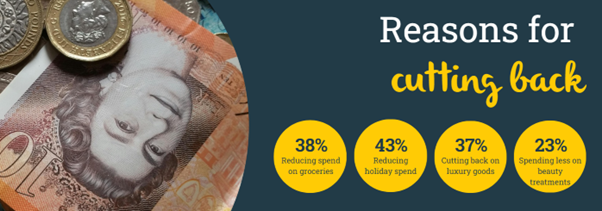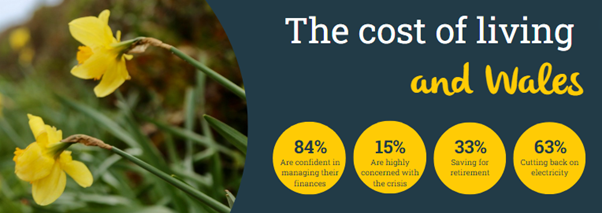Browser Not Supported
We no longer support Internet Explorer 11 as a browser.
Please download a more secure modern browser below.
We no longer support Internet Explorer 11 as a browser.
Please download a more secure modern browser below.
Every year since 2022, we’ve surveyed around 2,000 UK residents to gather their thoughts and opinions on the cost of living crisis. This year’s survey, updated in May, has revealed new insights.
The crisis began during 2021 amidst the socio and political climate the world was under at the time. Unfortunately, many of the lasting effects have caused inflation to rise, increasing the cost of everyday items like food and energy.
However, there is some positive news. The situation has thankfully gradually started to improve. In December 2023, inflation dropped to 4.2% - the lowest since October 2021.
So, how is the UK coping with the cost-of-living crisis as of 2024? Let’s find out.
The phrase “cost of living” refers to the usual, everyday expenses that a typical household has. Car payments, mortgages, groceries, all of it falls under the cost of living.
Various economic factors have caused these costs to rise faster than household incomes, leading to a crisis.
While inflation is a good indicator as to how the cost of living crisis is unfolding, it doesn’t tell us the whole story.
As of June 2024, Consumer Price Inflation (CPIH) for all items sits at 2.8% - the lowest since September 2021. This is down from 7.3% in June 2023 – a reduction of 4.5%.
Although inflation is coming down, this doesn’t mean people aren’t still experiencing financial difficulties. This year, 49% of our respondents claimed rising inflation to be their biggest concern. While this is still just under half of those we surveyed, it's 12.2% lower than it was in 2023.

In 2024, we’re pleased to see that concern levels around the cost of living crisis are beginning to improve. 74% of our respondents are concerned about the crisis – a 2% reduction since 2023 and a major 9% reduction from 2022.
Alongside this, consumer confidence levels around managing finances are also improving. 80% of our respondents feel confident about their finances, an 8% increase since 2023 and a 15% increase from 2022.
Though, there are still some lingering concerns. This year, 70% of our respondents are reducing their electricity usage for financial reasons.
Alongside a gradual decrease in overall fuel prices, the level of concern around fuel prices has decreased by 7.5% compared to 2023, with a substantial difference seen compared to 2022. In March 2022, 79% of our respondents were concerned about fuel prices, by 2024, this concern dropped to 44%.
As we mentioned previously, 49% of our 2024 respondents said inflation was on their list of concerns. While this does still seem high, it helps to know that this is actually 12.2% lower than in 2023, and 18.4% lower than in 2022.
In 2024, we found roughly 3 in 4 people (75% of respondents) told us they were concerned about food prices. This lines up with reports from Food Foundation in April 2024, which reported the price of a basket of shopping for women has increased by 24.1% over the past two years – the male basket has increased by 26.6%.
With this survey, we wanted to gauge the public’s view on increases to council tax rates, which itself is liable to increase in England by as much as 5.1% in 2024-2025 compared to 2023-2024. We learned that over half of the people surveyed (52%) are concerned about council tax increases.

Saving is much easier when you have a goal in mind. Being able to visualise your objectives makes them much more achievable, and it’s clear the UK has its savings priorities in order.
There were some slight differences in the reasons for saving in 2024 over 2023, but most of the motives remained the same.
Of respondents claimed to be saving for retirement.
Have had to dip into their savings to pay for everyday expenses.
Will be putting less into savings this year.
Of people would move their savings into a higher interest account if they found one.

While, like last year, people are cutting back on their expenses, our research has revealed people are taking a more relaxed approach in 2024 compared to 2023.
Specifically, fewer people claimed to be cutting back on grocery shopping, luxury goods, holidays, subscriptions, dining out, socialising and gym memberships. However, there are a couple of expenses that have more people cutting back than before, including car loans and beauty treatments.
Are less likely to cut back on holidays and luxury goods.
Would consider remortgaging to consolidate debt.
Of people are cutting back on beauty treatments vs 19.9% in 2023.

With concerns around the cost of living crisis easing, we were curious to see if and how people's holiday plans are changing. We therefore asked a few more probing questions on the subject, and made some interesting discoveries:
Said their holidays were impacted by the cost of living crisis.
Of people have a savings plan in place for their holiday.
People rely on help from their families to pay for their holidays.
Saved less for their holiday this year due to the cost of living crisis.

As a proud Welsh bank, we wanted to check in on how our home country is coping with the cost-of-living crisis. We seperated out some responses from our candidates that said they lived in Wales and noted down the differences between Wales and the UK.
We found 33% of people in Wales are saving for retirement (vs 28% of the UK), and only 3.4% of Welsh people are saving for a house deposit, as opposed to 7% of the rest of the UK. We also found only 1.7% of Welsh respondents said rises in interest rates was a reason to save, compared to 4.2% of the UK.
On the whole, Wales is less concerned about the cost-of-living crisis compared to the rest of the UK. On a scale of concern, 15.5% of Welsh respondents said they are highly concerned, compared to 23.3% of the UK.
Of Welsh people concerned over energy prices, with 16.4% saying they are highly concerned, compared to 24.5% of the UK.
Of Welsh respondents are cutting back on electricity.
Of Welsh respondents are confident when it comes to managing their own finances.
Of Welsh respondents going on holiday are planning to go abroad.